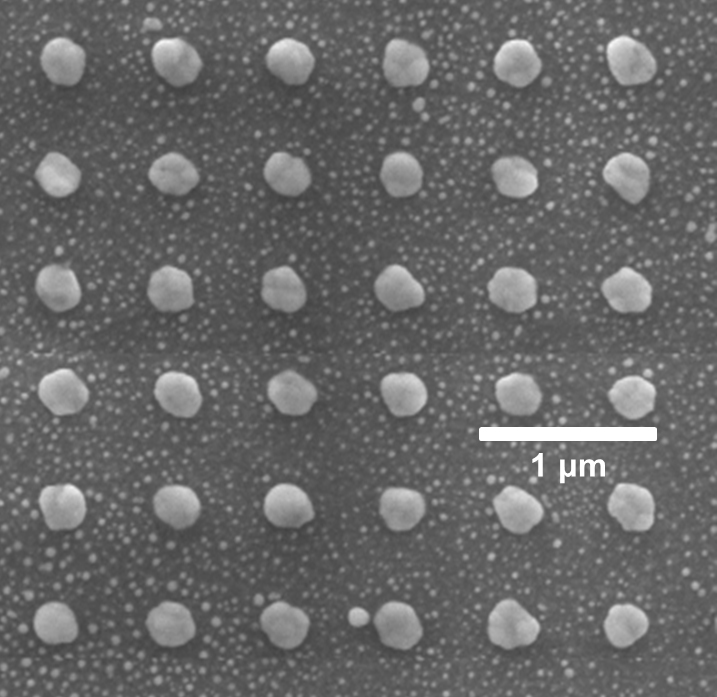MicroEP Student Recognized by the Department of Energy

Nanoparticle arrays like this one can be used to create sensors for nuclear facilities and healthcare providers.
Drew DeJarnette, a doctoral candidate in the microelectronics-photonics program, received second place in the Innovation in Fuel Cycle research awards in June. This award, which is sponsored by the Office of Fuel Cycle Technologies of the U.S. Department of Energy, recognizes outstanding student publications in the fuel cycle field.
DeJarnette's winning paper is titled "Spectral patterns underlying polarization-enhanced diffractive interference are distinguishable by complex trigonometry." Justin Norman, an undergraduate student, was a contributing author, and Keith Roper, assistant director of the microelectronics-photonics graduate program and DeJarnette's faculty mentor, was the principal investigator.
These researchers have developed methods to design and build ordered arrays of metal nanoparticles that can be used in many different kinds of sensors and detectors. The nanoparticles, which are arranged on a ceramic surface, are spaced about 600 to 1000 nanometers apart—the wavelength of optical and near-infrared light. Researchers can shine a light through the array and measure its response with a spectrometer. A fluid passing over the top of the array will change the response of the light, allowing researchers to detect different chemical properties of the fluid.
This system was recognized by the Office of Fuel Cycle Technologies because of its possible application in the field of nuclear science. For example, DeJarnette explained that the sensor could be used to determine the amount of nuclear waste in water. The sensor has many other possible applications, including several in the field of healthcare. It could be used to detect biomarkers in blood, or to measure blood sugar levels. Roper's research group is currently optimizing the arrays for these and other possible applications.
"I am so pleased with Drew's achievement," said Roper, who holds the Charles W. Oxford Endowed Professorship in Emerging Technologies in the Ralph E. Martin department of chemical engineering. "He is very deserving of this award, and it's a great reflection of the quality of students the graduate programs on this campus can attract."
The microelectronics-photonic program is an interdisciplinary program in the College of Engineering and the J. William Fulbright College of Arts and Sciences.
Topics
Contacts
Camilla Medders, Director of communications
College of Engineering
479-575-5697,
camillam@uark.edu
Headlines
Fay Jones School Faculty Projects Recognized With 2024 Architectural Education Awards
Professors John Folan, Candice Adams and Emily Baker were each a part of teams that received 2024 Collaborative Practice Awards from the Association of Collegiate Schools of Architectuure.
2024 UARK Jazz Festival Hosts Series of Performances April 16-19
Hosted by the Department of Music, the festival will feature some of the region’s finest jazz and classical musicians and feature special guest artist Angel “Papo” Vázquez.
Engineering Students Spend 'Alternative Spring Break' Touring Missouri Companies
Nearly two dozen College of Engineering students visited a group of Missouri employers as part of Alternative Spring Break, a three-day tour helping employers with recruitment and students with future careers.
Outstanding Alums, Students Recognized by Crop, Soil and Environmental Sciences
Mike Phillips, Edgar Mersiovsky, Robert Rorie and Jody Davis were honored at the annual Department of Crop, Soil and Environmental Sciences Spring Awards Banquet, along with several students.
Heather Sprandel Recognized as March 2024 Cordes Chair by TFSC
Heather Sprandel, instructor of management in the Sam M. Walton College of Business, was honored by the Wally Cordes Teaching and Faculty Support Center as the March 2024 Wally Cordes Chair.




